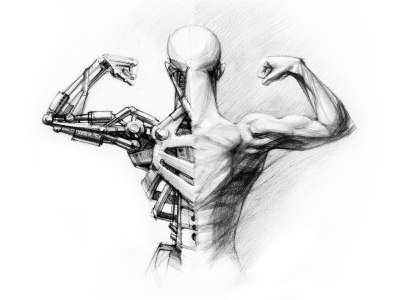Computers, by their very nature, don’t need to have a point of view. However, for our purposes, it is often preferred that they do. In the days before natural language processing, this manifested as a bias towards other computers. For example, Macintosh hardware didn’t run Windows software until 2006, and printers weren’t recognized by PC hardware without deliberate driver installation until Windows 7 came out in 2010. But as of late, computers are capable of holding a new kind of ‘bias’, that being a ‘biased’ opinion about human beings, and about the world at large. This past year computers began working as journalists, writing articles about data-intensive topics such as weather and sports. For articles generated by the software program Statsheet, over 80% of the time, sports readers cannot tell whether a computer or human has written the article. Say [...]
Home
- Recent Posts
Recent
- Singularity University Lectures: Dr. Alex Jadad on Making Longer Life Worth Living
- Peter Diamandis’ Laws: The Creed of the Persistent and Passionate Mind
- Singularity University Lectures: Science Searches for ET by Seth Shostak
- Google’s Self-Driving Robocar at Singularity University
- Singularity University Lectures: Mark Jacobson on Powering the World with Wind, Water and Sunlight
What's popular?Popular
- The Perils of Voice Recognition Technology
- Singularity University Lectures: Astro Teller on Innovation
- Charlie Stross on Singularity 1 on 1: The World is Complicated. Elegant Narratives Explaining Everything Are Wrong!
- Can Terraforming Venus Be The Solution To Population Growth?
- Vernor Vinge on Singularity 1 on 1: We Can Surpass the Wildest Dreams of Optimism
- How Do Transhumanists Party?
- Transhumanism for Children
- A Day Made of Glass: Corning’s Vision of the Future of Display Technology
PodcastsPodcast
- Singularity University Lectures: Dr. Alex Jadad on Making Longer Life Worth Living
- Singularity University Lectures: Science Searches for ET by Seth Shostak
- Singularity University Lectures: Mark Jacobson on Powering the World with Wind, Water and Sunlight
- Singularity University Lectures: Astro Teller on Innovation
- Peter Diamandis on Singularity 1 on 1: Singularity University is Star Fleet Academy for the World’s Biggest Challenges
- Charlie Stross on Singularity 1 on 1: The World is Complicated. Elegant Narratives Explaining Everything Are Wrong!
- Jaron Lanier on Singularity 1 on 1: The Singularity Is A Religion for Geeks
- R.U. Sirius on Singularity 1 on 1: Question the Authority of Your Brain
- Vernor Vinge on Singularity 1 on 1: We Can Surpass the Wildest Dreams of Optimism
- Question Everything: Max More on Singularity 1 on 1
BestBest
- How Do Transhumanists Party?
- Love and Sex with Robots: The Next Step of the Relationship between Man and Machine?
- A Little Bit Pregnant: Cory Doctorow at Boundaries, Frontiers and Gatekeepers iSchool Conference
- The Singularity and UFOs: Can ET Teach Us Anything about the Singularity?
- Kevin Warwick on Singularity 1 on 1: Be/Come the Cy/Borg
- Aubrey de Grey on Singularity 1 on 1: Better Funding and Advocacy Can Defeat Aging
- Stephen Wolfram on Singularity 1 on 1: To Understand the Future, Explore the Computational Universe
- Why I Am an Optimist
-
-
-




















 Singularity Weblog is a journal of Nikola Danaylov's thoughts on trends, news, issues and people related to the
Singularity Weblog is a journal of Nikola Danaylov's thoughts on trends, news, issues and people related to the 
